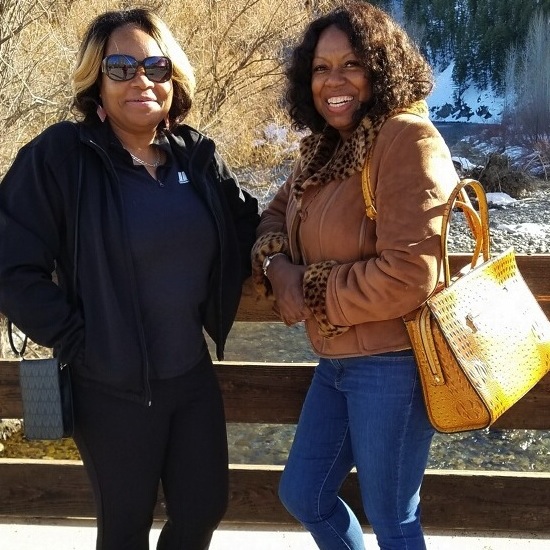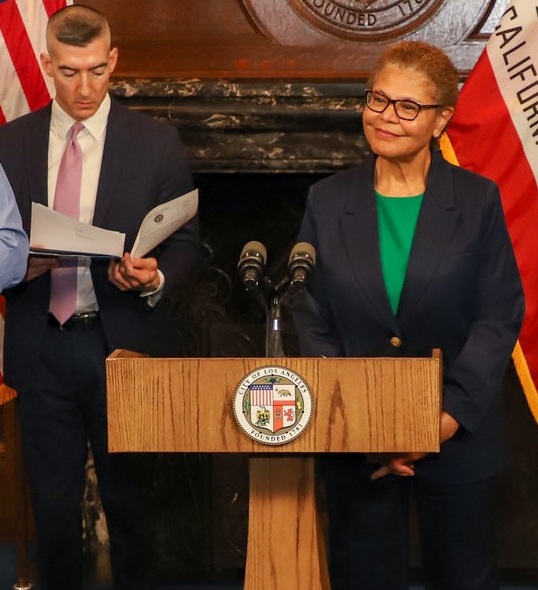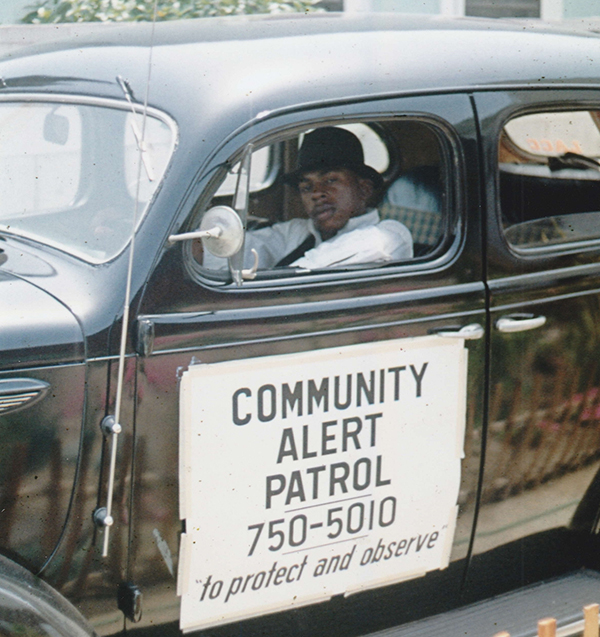LEIMERT PARK — While attending the annual weeklong National Brotherhood of Skiers summit in Sun Valley, Idaho, Feb. 29-March 7 Nyla Jefferson contracted COVID-19.
At the time, the coronavirus had not yet become a menace in the U.S.
Four months later, the COVID-19 health crisis has exploded across the country, hitting California particularly hard. Due to soaring new cases of the coronavirus and an upsurge in hospitalizations, California is back on lockdown except for essential businesses or those who can operate safely outdoors.
Jefferson was not the only person to contract the virus during the National Brotherhood of Skiers summit. Unfortunately, nearly 200 fell ill and five died.
The group, comprised of 55 Black ski clubs representing 43 cities and a membership of more than 3,000, is recognized by the ski industry as the largest assembly of Black skiers and snowboarders. The summit is an occasion to bring all of the Black ski clubs together for what is essentially a Black family reunion complete with slope-side picnics, theme parties, fundraisers and board meetings.
During a recent interview, Jefferson talked about her time at the summit, and later, hearing the diagnosis and what it felt like during her recovery.
Although she doesn’t belong to a Black ski club, Jefferson had attended the last five summits with her cousin and younger sister and was looking forward to attending this year’s event, once again, with her younger sister, Myka Godwin, her son, Akil Barnes and his friend.
“We were all looking forward to it,” Jefferson said. “It was me, my sister, my son and his friend.”
The week was filled with a number of social gatherings.
“NBS is a lot of fun,” said Jefferson, who works in the executive offices of the Los Angeles County Board of Supervisors. “There is a party every day of some kind. It’s a festive atmosphere.”
Near the end of the trip, Jefferson’s health took a turn.
“I just felt horrible,” said Jefferson, who lives in Leimert Park. “I craved a place to sit because I was so tired. I didn’t know it was COVID-19 at the time. I had read about it prior to going to the summit, but I never thought it would hit a little city in Idaho. I was so fatigued. I initially thought it was a cold.”
She soon developed a cough.
“I was thinking it could be COVID, but I wasn’t sure,” she said. “I knew it was transmitted through coughs. So when I got on the plane to come home, I coughed into tissues. I was tired, then I wasn’t. The virus gives you an illusion that you’re OK when you’re not. I knew I was sick.”
When Jefferson arrived home on March 7, she still had no idea what was to come.
Although she wasn’t feeling well, Jefferson accompanied a friend to Costco.
“I couldn’t even walk,” said Jefferson, whose friend never got sick. “I had to sit on a couch while my friend shopped. The next day I went to the ER. I had chills, a cough and was very fatigued. I got tested for the flu. They said to go home and isolate until they knew the results.”
Jefferson, whose sister had also contracted the virus at the summit, but whose son was spared, said her roommate panicked after learning of her symptoms.
“She wanted to get tested,” Jefferson said. “But because she lived in the same place, the ER people told her she couldn’t come in, and to isolate.”
Eventually, the dreaded call came.
“On March 9 or 10, the public health department called and said I had the virus,” Jefferson said. “My doctor called to say the same thing. I proceeded to call everyone I was in contact with. The health department tracked my contacts. I got a letter saying I was quarantined until March 31.”
As soon as she got the results, Jefferson called her job and told them she had to isolate.
She said their reaction was, “Oh, no. Stay home.”
Although the news was not what she wanted to hear, Jefferson, who did not have to be hospitalized, said she wasn’t shocked.
“I had a feeling,” she said. “I don’t get sick very often. I know what the flu feels like. This felt different for me. My illness was pretty severe. I had horrible chills. I would just cough and cough. The mucus in my lungs was bright greenish-white and thick. My doctor prescribed Mucinex.”
Jefferson stayed isolated from her roommate from March 7 to April 6. She ordered food from Postmates and ordered groceries from Ralph’s. She ate fruits and raw veggies and lost 15 pounds.
Jefferson felt so bad, all she could do was stay in bed.
“It took me a full 14 days to recover,” Jefferson said. “I couldn’t even brush my teeth or take a shower because I was so weak. For 14 days, all I did was cough, sleep and watch TV.”
During that time, Jefferson said everything she ate tasted bad.
“I had no sense of smell or taste,” she said. “I don’t know when my sense of smell and taste went away. All I know is that the food tasted bad. At the time, I didn’t know you could lose your sense of smell and taste.”
Jefferson said she received a call from the public health department every day.
“The 15th day they said they would send a release form so that I could go out into the world,” Jefferson said. “When I started leaving my room and leaving my house, I would be out of breath and would need to sit down.”
Jefferson, who started working remotely in April, feels better now, but she says there are some lingering side effects.
“I still feel fatigued and I have low stamina,” she said. “It’s still in a recovery process. My lungs are compromised. My breathing is still labored. I have shortness of breath, but I do feel better. I guess it will just take time. I’m in the process of rebuilding my stamina now.”
Through the whole ordeal, Jefferson never thought she was going to die.
“I was too naïve to think it,” said the Nashville native. “I looked at it as a cold-like illness. I never thought of it as being fatal.”
On March 21, Jefferson learned through a friend that others who attended the ski summit had tested positive for COVID-19.
“I just couldn’t believe it.”
In what can only be described as devastating, COVID-19 blew through the National Brotherhood of Skiers membership like wildfire. Days after the event, the organization sent an email to its members notifying them that attendees had tested positive for the deadly virus. Of the 600 attendees, hundreds were stricken with the virus and five died, including three who lived in California.
Jefferson, who faithfully wears a mask and uses hand sanitizer, believes her good health prior to catching the virus, helped her.
“I play sports,” said Jefferson, who has high blood pressure. “I’m also a vegetarian. I think it helped. This is not an illness that can be taken lightly. It’s a real sickness. Who knows what the long term effects will be?”
Asked if she would ever attend another National Brotherhood of Skiers event, Jefferson said she would.
“I would go back,” said Jefferson. “It’s not their fault that it happened. It’s just one of those things that happened to happen there.”
Author











